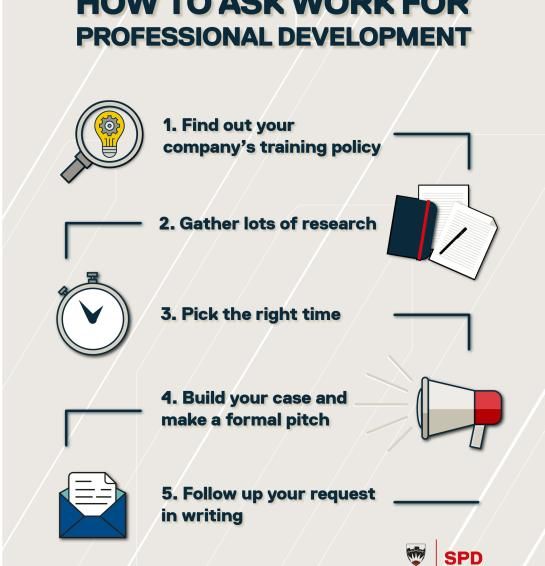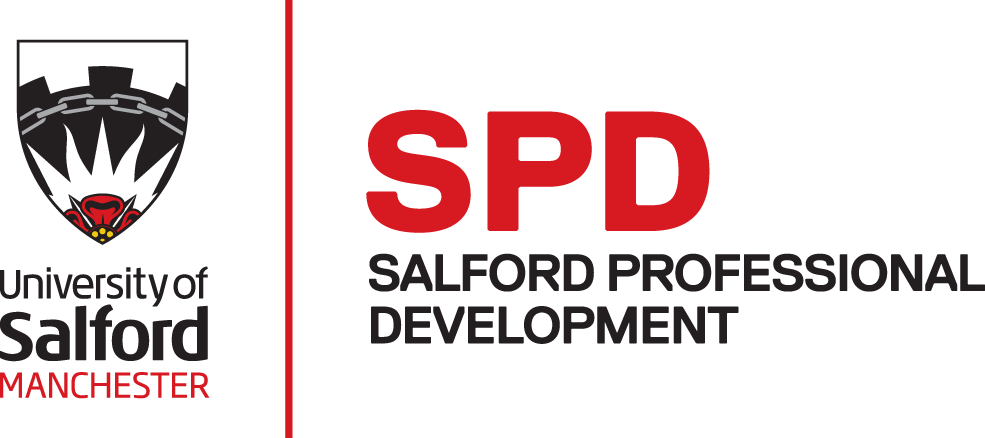How to ask your work/organisation for professional development
How to ask your work/organisation for professional development
Creating and following a professional development plan is something that you should be regularly doing to progress professionally. It enhances your career development and improves the performance of businesses through learning new skills, refreshing an employee’s knowledge, and building better morale in the workplace.
A professional development plan is needed in all areas of a business from every industry. This includes juniors up to executives. Everyone and organisations need to receive or undergo professional development, no matter what level employees are at in their careers or how small/big an organisation is.
In this blog post, we will explain why a professional development plan is essential, how you can successfully ask for professional development from your work and give you 5 simple steps on how to do this.
What is Professional Development, and Why Do Businesses Need It?
A professional development plan encompasses all the different types of learning associated with someone’s workplace and career opportunities. This includes academic training, advanced professional training, conferences, and informal training such as independent reading and workplace peer learning. Professional development is taught in many ways, from lecture/seminar-based sessions to more technical sessions such as community practice and technical assistance.
Programs and courses that are needed for professional development can include both single employee development, where your organisation places one person from a team on a course, or a large group of people such as healthcare professionals who all have a similar skill that needs developing.
The key objective of a professional development plan is to help you develop yourself as a professional and continue to learn new skills, refresh current skills, and keep yourself up to date with any new advances in your chosen profession.
Why is Professional Development Important?
No matter what stage you are at in your career, what your educational level is, or what industry you work in, it’s expected that you continue professionally developing in your occupation and work to the best of your ability.
The world and the customers within it are constantly changing, and so does the need for businesses and employees to evolve. That’s why a professional development plan is important.
Professional development ensures that your academic background and practical skills don’t become outdated and allows you to continuously progress these crucial skills.
Here are some other important outcomes of professional development:
- Improves your confidence
- Enhances your hiring potential
- Increases job opportunities
- Expands your networking opportunities
- Increases employee retention
- Increases employee job satisfaction
- Demonstrates an ability to self-improve
- Allows you to stay on top of the latest developments
- Allows you to maintain the same professional standards as others in your field
- Allows you to upskill your CV
How to Ask Your Organization for Professional Development
We’ve come up with the 5 most important steps you can take to effectively ask for professional development from your boss and the organisation you work for. These steps should give you a greater chance of receiving the professional development you need or simply give you a step in the right direction concerning your career.
1. Find Out Your Company’s Training Policy
The first step to take before asking your work for professional development is to find out what the training program policy is.
Most organisations will have a procedure for training programs and professional development. For example, this could be a formal written policy that can be found in your staff handbook or online through your company’s intranet.
It’s worth asking HR about any policies so that you have a better understanding of the procedure and can be well-prepared when asking for professional development.
It’s likely that if there is a policy, there will be a set budget for professional development and training programs each year. If you find this is what your company implements, then it's best to request training when you know the funding will be reinstated.
Top Tip: Make sure you find out who has the final sign-off for your training program as you’ll need to tailor your request for a greater chance of pitching your case and getting the professional development you want and need.
2. Gather Lots of Research
The second step to take is to gather in-depth and relevant research. Start by researching what skills you currently feel you lack or are not confident in regarding your profession. Find out why these skills would benefit you and your organization in your chosen career path.
Once you’ve listed these skills, research the available professional development resources available for these individual skills. Note down the cost, how long it will take to complete, and if there are any formal qualifications after completion.
Find out what the more accessible resources available are, such as academic self-help books and free online courses, then go more in-depth and look at conferences, learning and development programs, and certifications. It could be that some skills could be learned for free, and if this is the case, it would be worth asking your employer or manager if time can be set aside each week for studying.
You will also need to think about any obstacles that may arise and how you can overcome these. The most common obstacle organisations struggle with is budgeting. If this is the case, it’s important to come up with some low-cost and free opportunities. Online courses, job shadowing, and mentoring are great ways to overcome this hurdle.
If you’re still unsure of suitable professional development available, ask others in your industry who have more experience than you. Ask them how they got to where they are today in their profession. You can also ask colleagues, your manager, or a mentor for any recommendations.
Top Tip: If you studied at a particular university, some run continued learning programs and give discounts to their alumni, so it’s worth getting in touch if they do.
3. Pick the Right Time
After finding out what your work training program policy is, you should have a better idea of the best time to ask for professional development. If there isn’t a fixed training budget, it’s a good idea to find out how much annual budget is set for the year and if there’s any currently available.
If the budget’s set at a particular time of the year, try to request any professional development training program at least three months before that time. This allows you to be more flexible with your starting date. You can speak to your manager, HR, or a mentor for guidance on this.
4. Build Your Case and Make a Formal Pitch
Once you’ve gathered all your research and calculated the right time to request professional development, it’s time to make a formal pitch. Your research should present clear arguments that favor professional development, including all the different options available. Now it’s time to schedule a meeting with your employer to state your case.
In your meeting, bring your research with you, either digitally to share on screen or paper documentation. It’s important to present your professional development research with benefits for both you and your company.
Benefits to include:
- Cost
- Time of completion
- Qualifications, if any
- What skills you and/or your team will gain
- How these skills will contribute to the company
- How these skills will better prepare you and the company for the future
- Define how exactly the professional development training program will provide a return on investment for your employer’s time and money
Something to be aware of before going into your meeting is that some employers may be reluctant to provide professional development for fear that employees will pursue a career elsewhere with their new skills. So, make sure to address this by assuring them how happy you are in your current position, but also show them how enthusiastic you are about these new skills that will benefit you and your company.
Lastly, just assure them that you will give them regular updates on how the training program is going and how your skills are developing.
5. Follow Up on Your Request in Writing
After the meeting, send your employer a follow-up email with the research and documentation you presented. Recap the discussions you had and what the agreed next step will be. If budgeting was discussed as an issue, set a timeframe with them so you can continue the conversation at a more convenient time, and it gives them time to review what’s available. Make this email short and concise.
We hope this blog helps get you to the next step in progressing your career. However, if your request is rejected, don’t take it to heart. Ask for feedback on why and re-open it at a later date.
If your request is approved, congratulations! Make sure you get the very best out of the professional development learning and really make the most of it. Good luck!
If you want to find out more information on professional development for either you or your team, we have courses and conferences that might be what you’re looking for. Found out more here.

